Adventures of Longleg - Part I: Slash and Burn
In end of March, our friends Sanne and Chris came to visit and travel with us. After some destinations in Thailand, our journey took us to a small village named Vieng Poukkha in Laos. From there, we went out to do a two-day trekking trip into the Nam Ha National Park. Lena stayed in Huay Xai to fulfill a long-time dream of her, to do the Gibbon Experience.
The tropical hot season (up to 37°C) is perhaps not the best time to do a trek like this, but actually the second best. The rainy season is only up to 5 degrees colder but so humid that it feels at least as hot as in the hot season. Plus, of course, the paths become all muddy and slippery.
And finally, after almost one year in Thailand, I was awarded a Thai nickname: After I jumped over a few streams during the trek (instead of balancing on stones sticking out from them), the guide started to call me longleg1 :-)
Here are some photos of the trek:
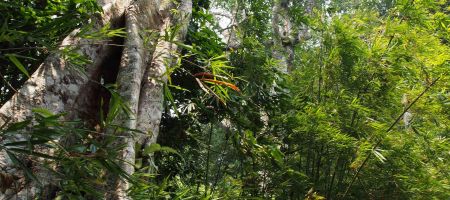
Just a massive rainforest tree with a strangulating vine around it
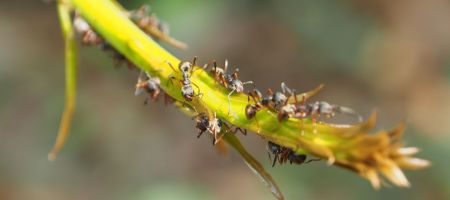
An ant highway leading up a cut branch
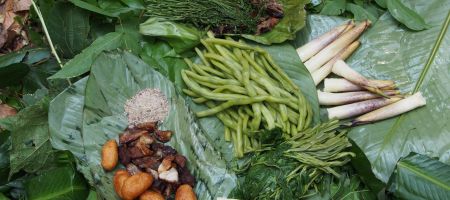
Lunch break on the rainforest floor. From left to right: Some sweet deep fried stuff from the market, bony pig meat, spice mix (mainly salt and chili), local spicy meat and veg., beans, spinach-y vegetable and the rightmost stuff is actually bamboo sprouts. Bamboo is such a versatile plant. The sprouts taste quite bitter, the sweetest part a bit like asparagus. Pickled bamboo sprouts are absolutely delicious!
In the afternoon, we got near the Nam Lo Akha village, our destination for the night. However, when it came into sight, we saw this. Fires, smoke and ash wasteland:
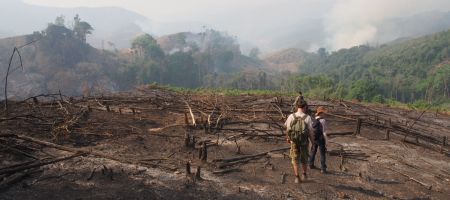
If you zoom in, you can see the village in the distance, shrouded in fog.)
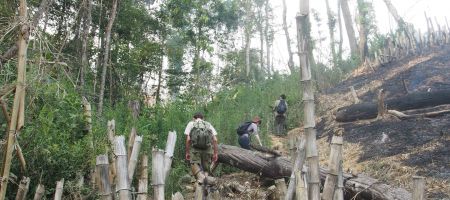
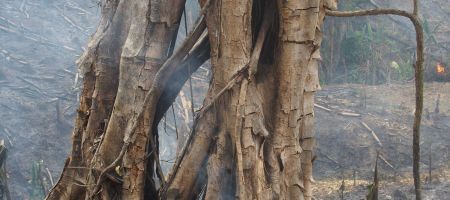
A strangulating vine which has long since killed its host tree and got strong enough to stand on its own probably survived the fire as the only tree around.
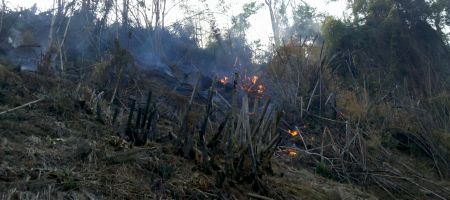
Many areas of the wasteland we were walking through were still gleaming, in others there were fires still. Burning bamboo cracks so loud, it sounds like gunfight.
So, what happened? Did the village and the whole area surrounding it burn down? No. The people from the village were just burning down areas surrounding their village for slash-and-burn cultivation the day we arrived. Our guide told us that this happens perhaps every 12 years or so (to that extent).
The ground in the mountainous regions in Laos is not very fertile, so the ethnic minorities who live there burn down areas of the jungle regularly to use the ashes as fertilizer. Needless to say, this is not exactly sustainable.
During the first day we walked through different areas that were burned down at different times in the past, it was interesting to learn how long a forest needs to regrow in this latitude:
A former village burned down 10 years ago (by accident). The area is now covered primarily with grass, shrubs and small trees up to 3m height.
Another area that was burned down 20 years ago is now covered in a dense bamboo forest – bamboo sprouts like mushroom (or rather, mushroom sprouts like bamboo? I heard there are types of bamboo that can grow up to 1m overnight).
Left untouched for 50 years, another area already looked like a forest again, but the trees were all quite young and not very large.
Another area in which also a former village stood was left untouched for more than 100 years. This area definitely looked like a rainforest again. However, it was easy to tell it apart from primary forest as the really big trees were missing and the forest was not really dense.
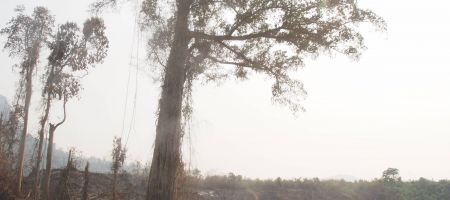
This huge tree survived the fire. Click the thumbnail to see a size comparison with a human. I can only guess its age, perhaps 500 years? 1000 years? How many trees of this size fell to the fire?
1 More spoken like lohläh. Thai and Lao always slur syllables.
So, Thai’ised English words are sometimes barely recognizable when translated back to English. Like “döhn” (modern, in fashion), “äbbön” (apple), “fränfry” (french fries), “motosai” (motorcycle) or “attanomat” (automatic). A constant hitch for Lena an me when we want to go home and have to tell the taxi driver the name of our apartment complex: “Golf View”. They understand it best when spoken something like “Gopbiu”.
